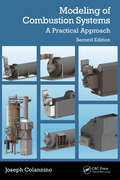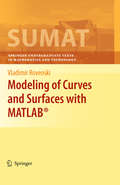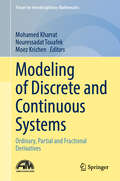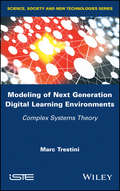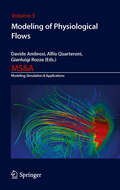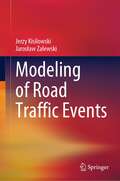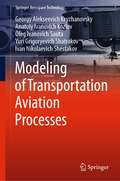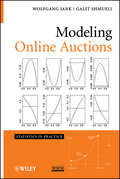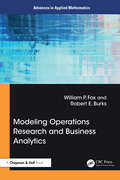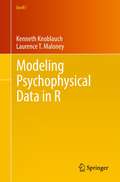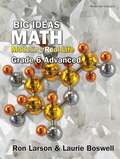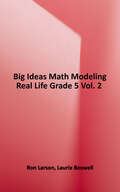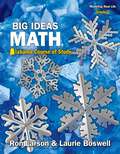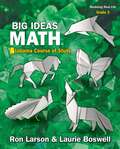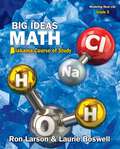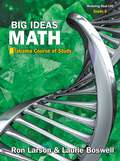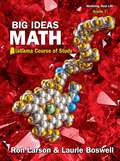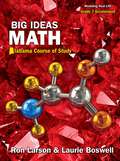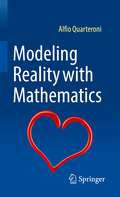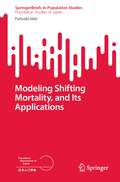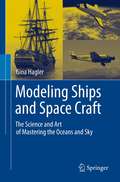- Table View
- List View
Modeling of Combustion Systems: A Practical Approach
by Joseph ColanninoModeling of Combustion Systems provides accessible instruction for the operator or engineer to model combustion responses such as NOx, CO, flame dimensions, or heat flux as a function of input factors, such as excess oxygen, firing rate, furnace temperature, and fuel type.Retaining the emphasis on practical semiempirical modeling of boilers, process heaters, and reactors, such as ethylene cracking units and ammonia and hydrogen reformers, the second edition expands the approach to include combustion air fans and representation of complex models (direct numerical simulations or computational fluid dynamics) in concise forms. It also shows how to design experiments to collect the most data with the fewest experiments and model real unit behavior with engineering accuracy.This book is intended for technicians, operators, and engineers working with fired equipment such as boilers, reactors, and process heaters.It includes 65 fully worked examples in MS Excel with detailed instructions. All example spreadsheets are available for download from the publisher’s website
Modeling of Curves and Surfaces with MATLAB®
by Vladimir RovenskiThis text on geometry is devoted to various central geometrical topics including: graphs of functions, transformations, (non-)Euclidean geometries, curves and surfaces as well as their applications in a variety of disciplines. This book presents elementary methods for analytical modeling and demonstrates the potential for symbolic computational tools to support the development of analytical solutions. The author systematically examines several powerful tools of MATLAB® including 2D and 3D animation of geometric images with shadows and colors and transformations using matrices. With over 150 stimulating exercises and problems, this text integrates traditional differential and non-Euclidean geometries with more current computer systems in a practical and user-friendly format. This text is an excellent classroom resource or self-study reference for undergraduate students in a variety of disciplines.
Modeling of Discrete and Continuous Systems: Ordinary, Partial and Fractional Derivatives (Forum for Interdisciplinary Mathematics)
by Mohamed Kharrat Nouressadat Touafek Moez KrichenThis book contains a comprehensive collection of chapters on recent and original research, along with review articles, on mathematical modeling of dynamical systems described by various types of differential equations. Structured into 18 chapters dedicated to exploring different aspects of differential equations and their applications in modeling both discrete and continuous systems, it highlights theoretical advancements in mathematics and their practical applications in modeling dynamic systems. Readers will find contributions by renowned scholars who delve into the intricacies of nonlinear dynamics, stochastic processes, and partial differential equations. This book is an essential resource for researchers, academicians, and practitioners in the field of mathematical modeling.
Modeling of Next Generation Digital Learning Environments: Complex Systems Theory
by Marc TrestiniThe emergence of social networks, OpenCourseWare, Massive Open Online Courses, informal remote learning and connectivist approaches to learning has made the analysis and evaluation of Digital Learning Environments more complex. Modeling these complex systems makes it possible to transcribe the phenomena observed and facilitates the study of these processes with the aid of specific tools. Once this essential step is taken, it then becomes possible to develop plausible scenarios from the observation of emerging phenomena and dominant trends. This book highlights the contribution of complex systems theory in the study of next generation Digital Learning Environments. It describes a realistic approach and proposes a range of effective management tools to achieve it.
Modeling of Physiological Flows
by Alfio Quarteroni Davide Ambrosi Gianluigi RozzaThis book offers a mathematical update of the state of the art of the research in the field of mathematical and numerical models of the circulatory system. It is structured into different chapters, written by outstanding experts in the field. Many fundamental issues are considered, such as: the mathematical representation of vascular geometries extracted from medical images, modelling blood rheology and the complex multilayer structure of the vascular tissue, and its possible pathologies, the mechanical and chemical interaction between blood and vascular walls, and the different scales coupling local and systemic dynamics. All of these topics introduce challenging mathematical and numerical problems, demanding for advanced analysis and efficient simulation techniques, and pay constant attention to applications of relevant clinical interest. This book is addressed to graduate students and researchers in the field of bioengineering, applied mathematics and medicine, wishing to engage themselves in the fascinating task of modeling the cardiovascular system or, more broadly, physiological flows.
Modeling of Road Traffic Events
by Jerzy Kisilowski Jarosław ZalewskiThis books reviews and brings readers up to date with the latest research knowledge on road traffic safety.It describes and discusses mathematical descriptions of the process of a motor vehicle crash and indicates the various factors that impact on collision models. It tackles also vehicle stability and shows how the forces generated in crashes result in different extents of post-accident repair. Mathematical models that simulate vehicle stability data are compared with those of real vehicles. Practical uses of the models are explained to readers.The book will be of interest to researchers in transport and vehicle technology well as automotive industry professionals.
Modeling of Transportation Aviation Processes (Springer Aerospace Technology)
by Georgy Alekseevich Kryzhanovsky Anatoly Ivanovich Kozlov Oleg Ivanovich Sauta Yuri Grigoryevich Shatrakov Ivan Nikolaevich ShestakovThis book presents the fundamental methods of modeling, analysis and synthesis of transport processes which allow: - to optimize the work of transport organizations according to different criteria of their functioning; - to evaluate the quality of decisions made in conditions of high entropy and uncertainty of technological processes when applying new technologies and systems; -to reduce the negative impact of the human factor on the safety of ongoing transport processes by increasing the motivational component of the training processes for the operator of active transport systems. The structural diagrams presented in this book make it possible to visualize the processes of training, self-training of operators and the mechanisms of the formation of volitional motivational efforts under various external influences of the environment and the teacher–instructor. The obtained functional dependencies serve as an assessment for determining and forming the dynamics of motivation and making a decision about the readiness for safe work of the operator of active transport systems and the decision-maker in the new conditions of the technological process.
Modeling Online Auctions
by Wolfgang Jank Galit ShmueliExplore cutting-edge statistical methodologies for collecting, analyzing, and modeling online auction data Online auctions are an increasingly important marketplace, as the new mechanisms and formats underlying these auctions have enabled the capturing and recording of large amounts of bidding data that are used to make important business decisions. As a result, new statistical ideas and innovation are needed to understand bidders, sellers, and prices. Combining methodologies from the fields of statistics, data mining, information systems, and economics, Modeling Online Auctions introduces a new approach to identifying obstacles and asking new questions using online auction data. The authors draw upon their extensive experience to introduce the latest methods for extracting new knowledge from online auction data. Rather than approach the topic from the traditional game-theoretic perspective, the book treats the online auction mechanism as a data generator, outlining methods to collect, explore, model, and forecast data. Topics covered include: Data collection methods for online auctions and related issues that arise in drawing data samples from a Web site Models for bidder and bid arrivals, treating the different approaches for exploring bidder-seller networks Data exploration, such as integration of time series and cross-sectional information; curve clustering; semi-continuous data structures; and data hierarchies The use of functional regression as well as functional differential equation models, spatial models, and stochastic models for capturing relationships in auction data Specialized methods and models for forecasting auction prices and their applications in automated bidding decision rule systems Throughout the book, R and MATLAB software are used for illustrating the discussed techniques. In addition, a related Web site features many of the book's datasets and R and MATLAB code that allow readers to replicate the analyses and learn new methods to apply to their own research. Modeling Online Auctions is a valuable book for graduate-level courses on data mining and applied regression analysis. It is also a one-of-a-kind reference for researchers in the fields of statistics, information systems, business, and marketing who work with electronic data and are looking for new approaches for understanding online auctions and processes. Visit this book's companion website by clicking here
Modeling Operations Research and Business Analytics (ISSN)
by William P Fox Robert E. BurksThis book provides sample exercises, techniques, and solutions to employ mathematical modeling to solve problems in Operations Research and Business Analytics. Each chapter begins with a scenario and includes exercises built on realistic problems faced by managers and others working in operations research, business analytics, and other fields employing applied mathematics. A set of assumptions is presented, and then a model is formulated. A solution is offered, followed by examples of how that model can be used to address related issues.Key elements of this book include the most common problems the authors have encountered over research and while consulting the fields including inventory theory, facilities' location, linear and integer programming, assignment, transportation and shipping, critical path, dynamic programming, queuing models, simulation models, reliability of system, multi-attribute decision-making, and game theory.In the hands of an experienced professional, mathematical modeling can be a powerful tool. This book presents situations and models to help both professionals and students learn to employ these techniques to improve outcomes and to make addressing real business problems easier. The book is essential for all managers and others who would use mathematics to improve their problem-solving techniques.No previous exposure to mathematical modeling is required. The book can then be used for a first course on modeling, or by those with more experience who want to refresh their memories when they find themselves facing real-world problems. The problems chosen are presented to represent those faced by practitioners.The authors have been teaching mathematical modeling to students and professionals for nearly 40 years. This book is presented to offer their experience and techniques to instructors, students, and professionals.
Modeling Ordered Choices: A Primer
by William H. Greene David A. HensherIt is increasingly common for analysts to seek out the opinions of individuals and organizations using attitudinal scales such as degree of satisfaction or importance attached to an issue. Examples include levels of obesity, seriousness of a health condition, attitudes towards service levels, opinions on products, voting intentions, and the degree of clarity of contracts. Ordered choice models provide a relevant methodology for capturing the sources of influence that explain the choice made amongst a set of ordered alternatives. The methods have evolved to a level of sophistication that can allow for heterogeneity in the threshold parameters, in the explanatory variables (through random parameters), and in the decomposition of the residual variance. This book brings together contributions in ordered choice modeling from a number of disciplines, synthesizing developments over the last fifty years, and suggests useful extensions to account for the wide range of sources of influence on choice.
Modeling Psychophysical Data in R
by Laurence T. Maloney Kenneth KnoblauchMany of the commonly used methods for modeling and fitting psychophysical data are special cases of statistical procedures of great power and generality, notably the Generalized Linear Model (GLM). This book illustrates how to fit data from a variety of psychophysical paradigms using modern statistical methods and the statistical language R. The paradigms include signal detection theory, psychometric function fitting, classification images and more. In two chapters, recently developed methods for scaling appearance, maximum likelihood difference scaling and maximum likelihood conjoint measurement are examined. The authors also consider the application of mixed-effects models to psychophysical data. R is an open-source programming language that is widely used by statisticians and is seeing enormous growth in its application to data in all fields. It is interactive, containing many powerful facilities for optimization, model evaluation, model selection, and graphical display of data. The reader who fits data in R can readily make use of these methods. The researcher who uses R to fit and model his data has access to most recently developed statistical methods. This book does not assume that the reader is familiar with R, and a little experience with any programming language is all that is needed to appreciate this book. There are large numbers of examples of R in the text and the source code for all examples is available in an R package MPDiR available through R. Kenneth Knoblauch is a researcher in the Department of Integrative Neurosciences in Inserm Unit 846, The Stem Cell and Brain Research Institute and associated with the University Claude Bernard, Lyon 1, in France. Laurence T. Maloney is Professor of Psychology and Neural Science at New York University. His research focusses on applications of mathematical models to perception, motor control and decision making.
Modeling Real Life: Grade 6 Advanced (Big Ideas Math)
by Ron Larson Laurie BoswellNIMAC-sourced textbook
Modeling Real Life
by Ron Larson Laurie BoswellThe Big Ideas Math: Modeling Real Life Student Edition Volume 2 provides students with learning targets and success criteria at the chapter and lesson level to make learning visible. There are diverse opportunities to develop problem-solving and communication skills through the balanced instructional design of Explore and Grow, Think and Grow, Apply and Grow, and Think and Grow: Modeling Real Life. Students master content, skills, and embedded mathematical practices through engaging activities with opportunities to enhance with games, songs, literature-based exercises that connect mathematics to the real world in an ideal context for elementary students.
Modeling Real Life, Grade 2, Volume 1 (Big Ideas Math)
by Ron Larson Laurie BoswellNIMAC-sourced textbook
Modeling Real Life, Grade 2, Volume 2 (Big Ideas Math)
by Ron Larson Laurie BoswellNIMAC-sourced textbook
Modeling Real Life, Grade 3, Volume 1 (Big Ideas Math)
by Ron Larson Laurie BoswellNIMAC-sourced textbook
Modeling Real Life, Grade 5, Volume 1 (Big Ideas Math)
by Ron Larson Laurie BoswellNIMAC-sourced textbook
Modeling Real Life, Grade 5, Volume 2 (Big Ideas Math)
by Ron Larson Laurie BoswellNIMAC-sourced textbook
Modeling Real Life, Grade 7, Accelerated (Big Ideas Math)
by Ron Larson Laurie BoswellNIMAC-sourced textbook
Modeling Reality with Mathematics
by Alfio QuarteroniSimulating the behavior of a human heart, predicting tomorrow's weather, optimizing the aerodynamics of a sailboat, finding the ideal cooking time for a hamburger: to solve these problems, cardiologists, meteorologists, sportsmen, and engineers can count on math help. This book will lead you to the discovery of a magical world, made up of equations, in which a huge variety of important problems for our life can find useful answers.
Modeling Shifting Mortality, and Its Applications (SpringerBriefs in Population Studies)
by Futoshi IshiiThis book describes a novel method for mortality modeling applying the shifting feature of the mortality curve. In Japan, the increase and pace of the extension in life expectancy have been quite remarkable. Therefore, existing mortality models often cannot capture the peculiarities of Japanese mortality, nor can the Lee–Carter model, which is now regarded internationally as a standard model. One of the important concepts to model recent Japanese mortality is a shifting feature. In this book, the linear difference model, which has many advantages for modeling and analyzing Japanese mortality, is introduced. The book shows applications of the model to mortality projection with a tangent vector field approach and decomposition of the change of modal age at death. The models introduced here are useful tools for modeling mortality with strong shifting features, as in Japan.
Modeling Ships and Space Craft
by Gina HaglerModeling Ships and Space Craft: The Science and Art of Mastering the Oceans and Sky begins with the theories of Aristotle and Archimedes, moving on to examine the work of Froude and Taylor, the early aviators and the Wright Brothers, Goddard and the other rocket men, and the computational fluid dynamic models of our time. It examines the ways each used fluid dynamic principles in the design of their vessels. In the process, this book covers the history of hydrodynamic (aero and fluid) theory and its progression - with some very accessible science examples - including seminal theories. Hydrodynamic principles in action are also explored with examples from nature and the works of man. This is a book for anyone interested in the history of technology - specifically the methods and science behind the use of scale models and hydrodynamic principles in the marine and aeronautical designs of today.
